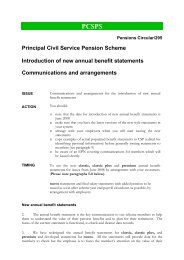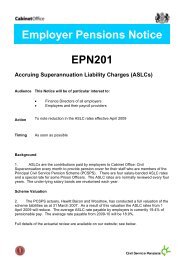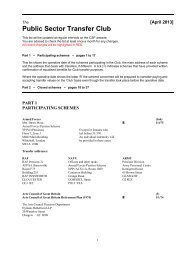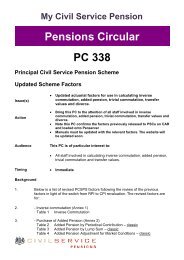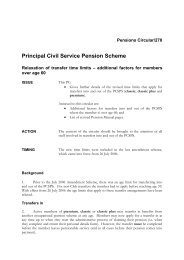Capability Reviews: Progress and Next Steps - The Civil Service
Capability Reviews: Progress and Next Steps - The Civil Service
Capability Reviews: Progress and Next Steps - The Civil Service
- No tags were found...
You also want an ePaper? Increase the reach of your titles
YUMPU automatically turns print PDFs into web optimized ePapers that Google loves.
<strong>The</strong> review team gave DCA four areas for action to focus on. <strong>The</strong>se were:• ‘Develop the senior leadership team, <strong>and</strong> improve how they engage with staff atall levels’: improving the way the senior leadership team works together <strong>and</strong> withstaff throughout the Department.• ‘Further develop the capacity to manage change <strong>and</strong> reform on a large scale <strong>and</strong>at pace’: improving change management <strong>and</strong> governance to tackle a toughagenda of change.• ‘Ensure clear, collective underst<strong>and</strong>ing of the business model to enable agencies<strong>and</strong> NDPBs to operate within a tight corporate framework’: articulating <strong>and</strong>communicating a clear business model throughout the Department, its agencies<strong>and</strong> NDPBs.• ‘Develop delivery capability to deliver more with less’: focusing on performancemanagement <strong>and</strong> delivering challenging outcomes.<strong>The</strong>se broad areas for action remain valid going forward, <strong>and</strong> the board hasreconfigured the detailed action points to reflect the work now needed in establishingthe new Ministry.Area for action 1: Develop the senior leadership team, <strong>and</strong> improve howthey engage with staff at all levelsDCA made progress in this area, focusing on improving board communications withstaff <strong>and</strong> raising the board’s profile across the organisation. This was achieved byintroducing regular staff forums, holding board meetings outside London <strong>and</strong> hostingevents with the senior leadership team from across the Department, its NDPBs <strong>and</strong>agencies. <strong>The</strong> new MoJ board has continued with its commitment to improvingvisibility <strong>and</strong> communications, <strong>and</strong> has taken early action to set up a structuredprogramme of staff engagement across the Department.In addition, the board has participated in a programme of regular developmentawaydays. Since the creation of the MoJ, this has included focused sessions todevelop the future business model <strong>and</strong> ways of working. <strong>The</strong> regular programme ofevents for the senior leadership team continues to engage with the SCS on theleadership challenges for the Department.Area for action 2: Further develop the capacity to manage change <strong>and</strong>reform on a large scale <strong>and</strong> at pace<strong>Progress</strong> in delivering change formed a key part of the CSR 2007 process, withchange funding now separately identified, planned <strong>and</strong> managed in the financialplanning process. <strong>The</strong> introduction of change-specific financial controls means thatthere is more rigorous scrutiny of costs <strong>and</strong> benefits delivery <strong>and</strong> improvedprioritisation of change programmes <strong>and</strong> projects. With new change governancegroups now thoroughly embedded <strong>and</strong> working effectively, the board has goodvisibility <strong>and</strong> control over the Department’s mission-critical change portfolio.18 TRANCHE 1 DEPARTMENTS: A YEAR ON




